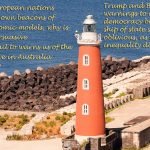Our economic commonality
Once upon a time the Republicans stood against slavery, fighting a bitter civil war over it (even if the recently installed president Donald Trump himself, is not sure what that conflict was all about). But now, the red shoe is very much on the other conservative foot.
The American economy was built on slavery, but the emancipation of the black population forced America to reconstitute slavery, redefining it by way of contemporary political spin. The now changed and more authoritarian Republicans have achieved this by instigating the largest per capita incarceration rate in the world, where prisoners slave for the private industrialised markets. And attempts by previous President Barack Obama to curtail this “market” are now being undone by his successor’s moves to boost it.
There are striking similarities in the Australian experience. Although rarely recognised as such, our own initial economic growth was also predicated on slavery of the convict and pacific islander variety. So we can claim no high moral ground. Similarly with America’s passion for “rule of law” and the devising of ever more draconian reasons for increasing incarceration. By way of example, where drug addiction and mental health are succesfully treated as a medical issue in more enlightened countries like Norway, in America and Australia they are still legal issues used to feed prison populations.
Australia is also no stranger to political ideology (once foreign and abhorrent to party politics, but which is now being swallowed whole). Australia as one of the instigators of, signatories to and loud supporters of the UN refugee human rights platform, now holds refugees in foreign gulags across our oceans. Such treatment would have been unthinkable to foundational conservative stalwarts such as Robert Menzies, who in 1954 was amongst the first to ratify the Refugee Convention. Once we in Australia reached out to refugees and embraced them as new neighbours into our community, bringing food parcels and contact to strangers. Today we have the increasing fiasco of scandals and mistreatment of refugees, first by Morrison, and now by Dutton.
Once upon a time

Looking back, we were less afraid, our news of the wider world more limited. Admittedly our situation was hardly perfect. We were more openly racist as evidenced by the White Australia Policy. But we were also less willing to lie and obfuscate to justify our injustices. We were also more courageous, a little less insular in some manner, and far more attracted to science, wonder, community, tribalism and extended “families”. Our societies here and abroad had a larger and more prosperous middle class. Greed was a vice, not a virtue. Class distinctions may have seemed more obvious, but now – when they are more prevalent – they are less discussed. We used to be about societies but now we are all about economies. Interesting reading on that subject can be found in “An Economy is not a Society” by Dennis Glover.
Left and Right wing politics, Democrats and Republicans, Socialists and Conservatives stood for different approaches to the politics of life. Distinctions that existed have disappeared over time. The middle classes are vanishing and now the real polarisations are the rich and the poor, certainly not left and right. Christ was right when he said “the poor you will have always“. One wonders if he actually realised just how vast the gulf would eventually become between the poor and the rich (whom he frequently addressed to do something about it)? Money and it’s influence have become the ultimate distinction in western society.
“Greed is good!”
It no longer matters if you are Democrat, Liberal, Labor or Republican, as the common thread that holds our politics in undivided loyalty is Greed. The sort that Gordon Gekko from “Wall Street” once famously declared was Good (although a lot of his speech was also about the complacency of the powerful).
Today our political class embraces greed and complacency without reserve or hesitation. Politics is a lucrative business, as the recent scandals from One Nation demonstrate. Lobbyists, corporations, developers, the rich and empowered all bandy both “sides” of the political spectrum with donations, lucrative “political retirement” jobs and financial funding access. The political arena is awash with nepotism to jobs for the boys. That is on top of the significant salaries, lifelong pensions, travel and security concessions, and business opportunities, which are the dividends of a career in politics. Though even in these shameless times, perhaps Mike Baird, could have spared a little more effort towards maintaining the illusion of some propriety, by spending a little more than six weeks with his “ailing family” (his avowed reason for suddenly quitting the hallowed position of NSW Premier), before taking up the far more lucrative banking industry role with the million dollar salary.

The “sides” that successful political parties hold to today, are small deviations from an overall shared conservative class of values, with greed always being at the center. The “left wing” parties follow the “right wing” parties who have a differential approach to following the money. The pursuit of that money is closely followed by corruption, as the NSW ICAC has repeatedly found on BOTH sides of politics. I attended a lecture by Dr Knox-Haly at the University of Sydney’s 5th floor Abercrombie Room on the history of ICAC on the 19th of May 2017. Also in attendance was Elizabeth Kirby, the longest serving State Democrat MLC (now retired). While asking questions afterwards, Elizabeth pondered why both parties avoid a Federal ICAC. Dr Knox-Haly speculated that the differentiation for corruption between our primary two parties, was while the Liberal’s entitled mentality has little insight into their own corruption, “The difference is, that Labor actually has some insight that what they are doing, might be corrupt“.
Electing democracy
The “left wing” stay just marginally behind their similar “right wing” counterparts, for the purpose of declaring their “distinctions” to attract a community of voters who will largely vote for the “lesser of two evils“. Unfortunately, clever gerrymandering, electoral colleges, systems of disenfranchising classes of voters, legal court challenges and strategic alliances more often than not, ensure the public majority will is ignored.
In the recent American presidential elections, the Democratic candidate (Hillary Clinton) received three million more votes than the Republican candidate (Donald Trump), but due to the electoral college system, the Republicans won the presidency. Dismissing 3 million people as an example of fraudulent voting is not just unproven, intellectually lazy, ludicrous, and credibility stretching. It is also an acceptable lie, which relieves the “true believer” from any intelligent engagement in politics.
Similary in Australia, according to the AEC 34.73% of the electorate voted Labor and 28.67% Liberal in the last federal election. But political alliances with the Nationals and preference systems ensure the Liberals currently hold power in Australia, although only by the majority of one seat. Adding all Liberal, National and LNP primary votes, only accounts for 41.80% of the 13.5 million voters in Australia. In France, the majority voted against National Front candidate Marine Le Pen, and yet with 21.3% of the vote, she was still one of just two finalists in the last round of French elections (which she lost).
Trump won the American presidency but not the popular vote, because of an historical, artificially weighted voting system. It is arguable that there may have been good reasons for such weighted voting systems historically. But as times and circumstances have changed, such electoral systems have moved from serving the common good, to more likely serving small select interest groups driven by avarice and greed. Gerrymandering has largely been discounted in Australia by non-partisan boundary selections, but it is rife in America, even though it loudly and proudly proclaims itself to be the longest lasting “democratic republic” in the world.
Neo-liberal agenda origins
None of these weighted electoral voting systems started out as corrupt. The rebalancing undertaken was merely meant to provide a more equitable representation of the will of all of the people in a polity. For example, to avoid giving greater or overwhelming national influence to more populous urban and coastal areas, over the needs and will of smaller regional inland populations. A reasonable proposition on the surface of it.
But societies and technology have changed slowly over time, and unfortunately that electoral system has simply not adjusted (enough) to the changing nuances and circumstances of contemporary life. As a result, the erosion of democracy did not occur suddenly. The rights of the majority were rather whittled away through successive governments from both “sides” of politics. Privatisation of Public assets in Australia did not start with Conservatives, it began with Bob Hawke and Paul Keating. The “socialist” Labor party divorced itself gradually from its roots in the Union movement and its support of the working class. Similarly, Trump is not a new phenomenon. The pathway there was laid by Democrats and Republicans equally.
Obama was not a “socialist” black man. He was a privileged, wealthy man complicit with the greedy, über wealthy class he mingled with and still does. Unlike Iceland, he did not jail the people responsible for crippling his country’s economy, he paid them off. That mistake has cost America dearly. A repetition of a formula that has never worked but is repeatedly applied. The gold coloured glasses of privilege and wealth screened out the faces of the poorer masses, who had otherwise hoped that because he shared a skin colour, his filtered eyes might see their plight. His foreign policy was deplorable when it came to the Middle East, when you consider that Obama bombed seven countries adding to an enormous refugee crisis in Europe.
While I am being harsh with Obama, there are many things that are commendable about his administration, not the least of which is the extraordinary efforts he made to create (the now endangered) Obamacare. To be fair to the balance of this article, you should read the Rolling Stone’s article in regards his successes and failures. The good that a man may do, whether it is Obama or Keating, is oft undermined by what they either failed to address, or any concessions that were made to not ruffle the feathers of the wealthy cocks in the hen house.
Inequality

Neoliberal politics from both the “left” and the “right” have had a debilitating effect on egalitarian democracies. Neither “side” of politics (Labor/Liberal or Republican/Democrat) have a policy platform designed to rectify inequality, or our increasingly controlling police state, or our endless pointless involvement in wars on the other side of the planet. The best we can hope for is to be a little less unequal, by choosing a candidate that leans towards helping the proletarians. Instead each “side” have internalised neo-liberal conservative values to a lesser or greater extent. Unless either side tailors a persuasive vision of real world solutions based on evidence – as opposed to ideology – from more successful democracies (i.e. Europe), the downward spiral of inequality and social class division will continue. Unless the “lefter” side of “right” begin to propose policy platforms that could achieve a shift away from what cripples our economies, then they will continue to lose elections and the public’s faith.
It’s just a step to the left.
Interestingly in Australia, both Labor and Liberal have begun leaning a little to the left (Labor in policy and voting history, and the Liberals with regards to the 2017 budget). A departure from previous history. Such wins are small and their longer term future uncertain. The positive aspects of the 2017 Liberal government budget and health reforms, still exist in context alongside other classic neoliberal policies, such as tax breaks for the wealthy at the expense of the impoverished. Both Trump and Turnbull share the delusion that trickle down economics is a way forward, despite all the real world evidence that it has never worked. Wages and jobs remain depressed in both countries and unemployment is the only growth area.
Death by 1000 cuts.
Very few of the changes that harm our society are rushed, although the Rebublicans are certainly trying it with healthcare. Once suggesting the nascent beginnings of a possible policy paradigm shift – the very likely soon to be extinct Obamacare – has proven to be merely an ephemeral reform, yielding to an upsurge in the everlasting tidal vices of greed and self interest. Likewise, the increasing incremental attacks on Medicare in Australia are following a similar path by way of stealth such as freezes and coverage removals leading eventually to an American privatised style medical system.
Of course, even Trump recognises that Australia’s universal healthcare system is currently still a long way from being anything like what they have in America. However, the eventual dissolution of Medicare was never going to be a matter of outright overnight dissolution, in the manner that Trump and the Republicans are seeking to achieve with the dissolution of Obamacare. Rather, it will be the gradual death by one thousand cuts, with Australia gradually devolving to a system where big phama, hospitals, insurance, bio-medical and prosthetic companies garner huge profits at the expense of failing health and ageing demographics of our society.
Paths once trod we follow.

With so little political differences in policies, how will any of this change? Being self-contented and tranquil is the domain of spiritual gurus, saints and philosophers, but many of us find our political plight disturbing and seek change. America, although, is as unlikely to change anymore than the Roman Empire once did. Only collapse or revolution ever bought about real change in the Roman Empire. Is America’s only hope therefore, its eventual collapse? And even if that occurs how will it ever satisfy its insatiable vice of greed? How much longer will it take for Australia to follow that path? Do we have hope of another, less-traveled path? Is there hope that we are not as America-lite as some dread? For example, if you have to go to the pains that Matt Wade did to assert our differences, is that because he is aware of how many similarities we have? How long will such differences remain? And if either nation changes course, for how long shall we stay that course, guided by the sort of people that are currently attracted to a polity where self aggrandisement and avarice takes precedence over leadership, governance and vision? Some vices transcend time, revolution and society.